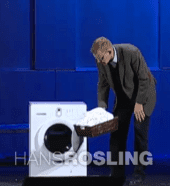 It’s hard not to love statistical stuntman Hans Rosling. Last year, he mesmerized us with a phenomenal augmented reality run through 200 years that changed the world in 4 minutes, as a part of BBC’s excellent The Joy of Stats series. (If you haven’t seen it, do — it’s free online and absolutely fantastic.)
It’s hard not to love statistical stuntman Hans Rosling. Last year, he mesmerized us with a phenomenal augmented reality run through 200 years that changed the world in 4 minutes, as a part of BBC’s excellent The Joy of Stats series. (If you haven’t seen it, do — it’s free online and absolutely fantastic.)
Now, he’s back with another blockbuster TED talk, demonstrating — with his characteristic blend of statistical rigor and delightful wit — that the washing machine was indeed the greatest invention of the Industrial Revolution, enabling everything from economic development through electrical efficiency to intellectual growth by reallocating free time for reading.
An interesting parallel emerges in examining Rosling’s talk in alongside Clay Shirky’s Cognitive Surplus: The washing machine is the antithesis of television, freeing up the same kind of “cognitive surplus” — excess human creative and intellectual energy — that, according to Shirky’s central argument, TV absorbed, a parallel that bespeaks the universal duality of innovation and the incredible potential of technology as a force of social change the polarity of which we get to choose.



